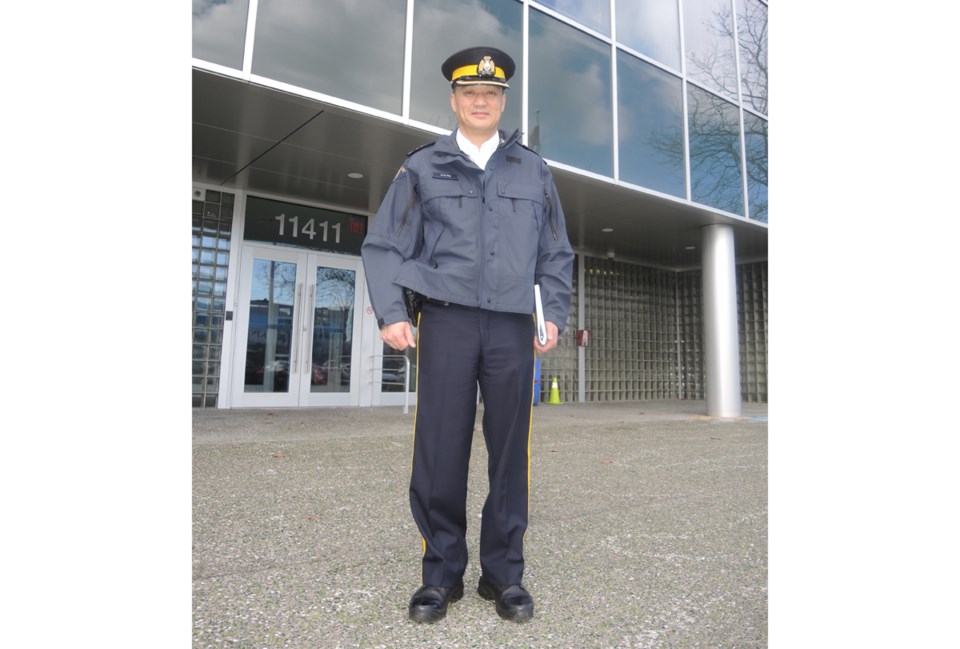Getting more Mounties walking the beat and more Chinese-speaking officers into the detachment are two of the top priorities for Richmond’s new top cop.
Supt. Will Ng, who’s taking over from Rennie Nessett, doesn’t officially step into his new role, leading Richmond RCMP, until next month. But he’s already sharpened his focus on key areas of improvement within his new detachment, starting with getting a greater police presence on the street.
“We’re going to try to increase the visibility on the streets and make officers more accessible to the public, to enhance the feeling of safety in Richmond,” Ng told the News on Thursday, citing public feedback in a recent review of police services as one of the reasons for the priority.
“We need to get officers out of their police cars and walking the streets in the community, talking to the likes of business owners.”
Ng — who began RCMP life in 1995 in Surrey, before carving out a distinguished career working in and leading specialized units across the Lower Mainland — said he plans to get more Mounties on the street by redirecting resources away from non-core police work, such as mental health calls.
“I’d like to reduce the calls for service that officers don’t need to go to,” explained Ng, who was born in Vancouver to Chinese immigrant parents.
“Mental health seems to be a high priority for our officers, in terms of resources. I’d like our officers to focus more on crime reduction.
“We do that by working with our partners at Vancouver Coastal Health. I recently visited a homeless shelter and they informed me eight out of 10 people that live there suffer from some form of mental health challenge and they call police at least three times per month to drive the patients to the hospital for observation.
“So (the officers are) getting sucked away to do that for one to two hours sometimes. There are ways we can reduce those types of calls.”
Enhancing current community policing programs, including the auxiliary service, said Ng, will also go a long way to directing the police energy to where he wants it to go.
“We also have a very strong volunteer base in Richmond; people want to help make Richmond safer and we’re going to be looking at more ways to leverage that assistance from the community.”
The fact that Ng speaks fluent Cantonese, and is working on improving his Mandarin, could very well be an asset, when it comes to encouraging more members of the city’s burgeoning Chinese-speaking community to engage with their local police force.
And hiring more officers that mirror that bilingual ability is very much on Ng’s agenda when he takes over the superintendent role next month, as he attempts to break down perceived barriers between the RCMP and the aforementioned community.
“I grew up here, but I still identify with Chinese culture, my parents are Chinese, they immigrated here in 1965,” said Ng, who describes himself as “Canadian-Chinese.”
“Growing up in the Chinese community, I got to understand the culture and traditions and I hope to leverage that to enhance my awareness of the community here.
“I was in ESL (English as second language) until I was in Grade 2. So, I understand the challenges of language barriers and not being able to communicate something in English.
“Hopefully, we can bring in more officers with language abilities and have more auxiliary officers with language abilities, to be more reflective of the diversity that we see in the community, and I don’t just mean Chinese; we have many different ethnicities in Richmond that don’t speak English.”
Ng acknowledged that some crimes in the city may go unreported due to language and cultural hurdles and one of his goals is to foster more trust in the community
“Quite often, it could just be something as simple as language and they can’t provide a statement in English and therefore they feel it’s hopeless,” he said.
“I don’t want that. I want the community to have trust that the police will be able to speak in their language and be able to take a proper statement from them, so they will be willing to come forward, when there is crime.”
Improvements to the city’s Blockwatch programs, via more social media and “more exciting training” is also on the hit list for Ng.
“Some of the neighbourhoods don’t have Blockwatch; we’re going to look at ways to bring them in.
“Eight-five per cent of break and enters take place in communities without Blockwatch. At the very least, we want to educate property owners to safeguard themselves and target-harden their homes.”
Ng said he wants to capitalize on Richmond’s “strong community engagement” and his detachment’s flourishing community program teams to further enhance public safety in a city he knows very well.
“My father worked at YVR as an aircraft mechanic for 25 years and I remember shopping at Woodwards at Lansdowne Mall when I was growing up,” recalled Ng, who has family in Steveston, through his wife, so spends much of his spare time in Richmond.



